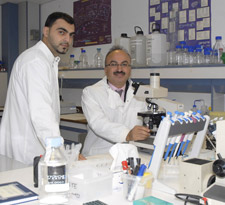Cancer research could improve survival rates
Posted Monday 23 November 2009
 Scientists have begun a three-year study to analyse why cancer patients become resistant to treatments designed to fight the disease. A research team from Kingston University has been awarded £99,000 to investigate why some tumours are sensitive and respond to treatments and why other tumours do not. The study, funded by cancer charity BRIGHT (Better Research into Gastrointestinal Cancer Health and Treatment), will look at existing treatments for cancer of the colon and rectum, known as colorectal cancer.
Scientists have begun a three-year study to analyse why cancer patients become resistant to treatments designed to fight the disease. A research team from Kingston University has been awarded £99,000 to investigate why some tumours are sensitive and respond to treatments and why other tumours do not. The study, funded by cancer charity BRIGHT (Better Research into Gastrointestinal Cancer Health and Treatment), will look at existing treatments for cancer of the colon and rectum, known as colorectal cancer.
Experts from Kingston's Faculty of Science will work with specialists at Royal Surrey County Hospital to examine tumour specimens from colorectal cancer patients. They aim to identify signs or markers which could indicate how patients respond to treatment with anti-cancer drugs. The scientists will also investigate whether cancer stem cells play an important role in the progression of colorectal cancer and could be responsible for the poor response or development of resistance to treatment with anti-cancer drugs.
Dr Helmout Modjtahedi, from Kingston University who is leading the research, said the study could help local health authorities to target drugs more effectively by identifying which patients would respond well to individual types of treatment. It would equally spare those who will receive no significant benefit from treatment with what are often expensive drugs. "We want to find out why some colorectal cancer patients respond well to particular drugs and why others don't," he said. "We also want to investigate why it is that after several cycles of chemotherapy, we tend to see resistance to the chemotherapy agents, which consequently have to be changed to overcome this drug resistance. Ultimately, we hope that the results of our investigation will improve survival among cancer patients. It should also help us and other scientists to develop new drugs to target those patients who do not respond well to medication currently available."
All the experimental works will be carried out at Kingston University's research laboratories and in the later stages scientists will examine tumour specimens from colorectal cancer patients, in collaboration with Dr Sharadah Essapen, Consultant Clinical Oncologist at the Royal Surrey County Hospital. Dr Essapen said the research could bring about improvements to patient care. "On behalf of the charity BRIGHT, we are very happy to support this important research which will help to improve our understanding of the response of colon cancer to current drug therapies," she said. "This may help to explain why some of our patients do better on chemotherapy than others, and hopefully lead to the development of new drugs that can target these cancers more effectively. Ultimately, our goal is to support research that may lead to improved patient outcomes."
The research is expected to conclude in September 2012.
Contact us
General enquiries:
Journalists only:
- Communications team
Tel: +44 (0)20 8417 3034
Email us



